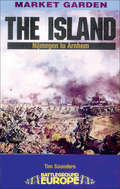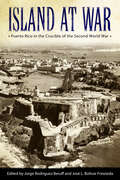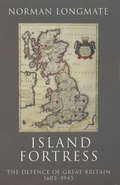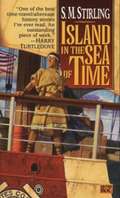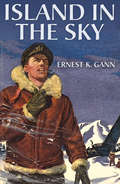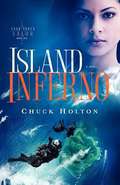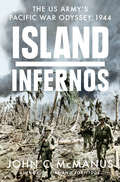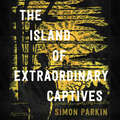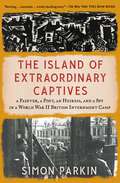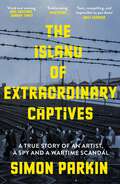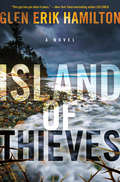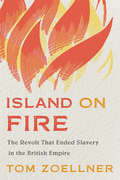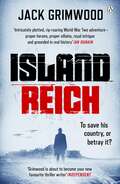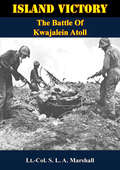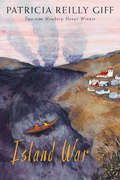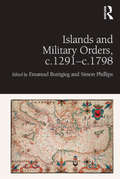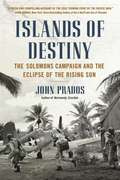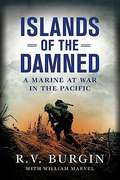- Table View
- List View
Islamikaze: Manifestations of Islamic Martyrology
by Raphael IsraeliRaphael Israeli's overview of Islamic martyrology focuses upon the situation that has developed worldwide since the World Trade Centre was destroyed. His thesis is that a sea-change has occurred in international terrorism that supersedes all other perspectives.
The Islamist Impasse (Adelphi series)
by Ibrahim KarawanSince the mid-1970s, Islamist groups have been important opposition forces in the Arab world and have posed a considerable challenge to regimes. However, their increased influence has not led to political power. Ibrahim A. Karawan argues that Islamist movements have been unable to form an effective and united opposition, and have therefore reached an impasse. Although regimes cannot afford to ignore their Islamist challengers, the Arab world is unlikely to witness a wave of Islamist take-overs. More than 17 years after the fall of the Shah, the Iranian revolution remains an isolated case in the Middle East. The growth of Islamism is fuelled by social, economic and political discontent. Islamist movements are not passing phenomena, but the actual political threat they pose will depend mainly on their ability to form broad coalitions, and on the willingness of regimes to introduce badly needed reforms. However, Islamist movements are divided over key issues of strategy and tactics. Regimes have exploited these divisions to contain their Islamist opponents, and have blended oppression and limited political accommodation to perpetuate their rule. Despite Islamist groups’ transnational language and ideology, national and sub-national issues drive their actions. Region-wide developments – notably the ‘oil revolution’ of the 1970s and Arab military defeats by Israel – are important in understanding the overall political climate, but they will not be crucial in deciding the outcome of the Islamist–regime confrontation. The influence of the West on Arab Islamism is also unlikely to be decisive. Islamist activism is stronger in areas with greater exposure to Western influences. States are therefore keen not to be seen as being too close to Western powers. In addition, there is no one Western stance towards Islamist movements, nor is there a unified assessment of the causes and policy implications of their resurgence. Contentious political issues confront Western powers, such as linking economic aid to human rights. Political and militant movements operating under the banner of Islamism are diverse. Their deep differences over the best means to achieve their objectives fragment their ranks and undermine their effectiveness. Although Arab regimes face many challenges, they have shown greater political resilience than analysts have expected.
The Island: Nijmegen to Arnhem (Battleground Europe)
by Tim SaundersHaving fought their way up fifty miles of Hell's Highway and through Nijmegen, XXX Corps was just ten miles from Arnhem and the 1st British Airborne Division. Here it found itself on an island of flat land between the Waal at Nijmegen and the Rhine at Arnhem. The situation was increasingly bad with the remainder of II SS Panzer Corps in the area and German counter attacks on Hell's Highway preventing the Allies applying their material superiority. The Guards Armoured and then 43rd Wessex Infantry Division took turns to lead before reaching the Rhine opposite the paratroopers in the Oosterbeek Perimeter. Attempts to cross the Rhine by the Polish Paras and the Dorset Regiment had little success, but meanwhile, the guns of XXX Corps ensured the survival of the Perimeter. After some desperate fighting on the island, 43rd Wessex Division evacuated just two thousand members of the elite Airborne Division who had landed eight days earlier.
Island at War: Puerto Rico in the Crucible of the Second World War (Caribbean Studies Series)
by Jorge Rodríguez BeruffDespite Puerto Rico being the hub of the United States' naval response to the German blockade of the Caribbean, there is very little published scholarship on the island's heavy involvement in the global conflict of World War II. Recently, a new generation of scholars has been compiling interdisciplinary research with fresh insights about the profound wartime changes, which in turn generated conditions for the rapid economic, social, and political development of postwar Puerto Rico. The island's subsequent transformation cannot be adequately grasped without tracing its roots to the war years. Island at War brings together outstanding new research on Puerto Rico and makes it accessible in English. It covers ten distinct topics written by nine distinguished scholars from the Caribbean and beyond. Contributors include experts in the fields of history, political science, sociology, literature, journalism, communications, and engineering. Topics include US strategic debate and war planning for the Caribbean on the eve of World War II, Puerto Rico as the headquarters of the Caribbean Sea frontier, war and political transition in Puerto Rico, the war economy of Puerto Rico, the German blockade of the Caribbean in 1942, and the story of a Puerto Rican officer in the Second World War and Korea. With these essays and others, Island at War represents the cutting edge of scholarship on the role of Puerto Rico and the Caribbean in World War II and its aftermath.
Island Deathtrap (Mack Bolan The Executioner #56)
by Don Pendleton[from the back cover] "Live Free or Kill! A foreign terrorist group had taken over a small island off the coast of Maine as a conduit for the importation of men and arms into the U.S. To ensure the secrecy of their hardsite, the criminals needed the help of the local lobstermen and independent fishermen. The mob had begun a campaign of terror aimed at wives and families to "soften up" the boatmen. One man, Ed Warner, had gotten through to Stony Man headquarters. Mack Bolan was determined to avenge the misery of Warner and his neighbors. He plunged head-on into the island deathtrap to grind hardened killers into minced meat.... And in his most perilous impersonation yet, Bolan breached the gang's defenses and became walking Death."
Island Fortress: The Defence of Great Britian 1606-1945
by Norman LongmateThe British Isles, it is often believed, have not been invaded for nearly a thousand years. In fact, as Norman Longmate reveals in this highly entertaining book (the successor to his acclaimed Defending the Island), foreign soldiers have landed on British soil on many occasions.In this definitive study of a long-neglected subject Norman Longmate make constant use of original sources, including contemporary eyewitness accounts. These are woven into an enthralling narrative, packed with fact - about weapons, ships, armies and fortresses - spiced with anecdote, and ranging over international and political as well as military and naval history. The result is above all an exciting story, which shows how, against all the odds, the British people managed to retain their freedom from the days of James I to those of George VI.
Island in the East: Escape This Summer With This Perfect Beach Read
by Jenny Ashcroft***THE EBOOK BESTSELLER***Perfect for fans of Lucinda Riley, Dinah Jefferies, Victoria Hislop and Lucy Foley.Two great loves. One shattering betrayal.A war that changes everything.**************'Island in the East is a stunner' Kate Furnivall'Exotic and mysterious - I was gripped' Dinah Jefferies'A moving, stirring love story' Rachel Rhys'Evocative, absorbing. . . A rich and satisfying read' Gill Paul'It becomes impossible to put this book down' Kate Riordan**************Singapore, 1897 Harriet and Mae Grafton are twenty-year-old identical twins born from a scandalous affair. They grew up in India slighted by gossip and ostracised from polite society. They had each other and that was enough. But when their wealthy benefactor sends them to Singapore, they meet the mysterious Alex Blake and their relationship fractures with devastating consequences.1941 Ivy Harcourt is posted to wartime Singapore amid the looming threat of Japanese invasion. Ivy knows the island will be a far cry from war-torn London, but she is totally unprepared for what awaits her: strangers from her grandmother Mae's past, an unstoppable love affair and a shattering secret that's been waiting to be uncovered . . .Vivid, authentic and utterly beautiful - with a sizzling love affair playing out against sisterly rivalry and epic family drama - Island in the East is romantic historical fiction at its very best.More praise for Jenny Ashcroft:'Beautifully described . . . A moving love story' Tracy Rees'A great read.' Judith Lennox'A summer must-read' Red'Love, sisterly rivalry and betrayal are themes in this epic tale'My Weekly'Brilliant; everything romantic historical fiction should be.' Nicola Cornick'Absolutely brilliant' Kerry Fisher'Completely entrancing . . . Perfect escapism, beautifully written.' Emma Rous'Evocative, lush and beautifully written, Island in the East is a gripping read.' Nikola Scott'First-class writing, brilliant characters, fascinating locations and gripping plots' Tracy Buchanan'Exquisitely written . . . unputdownable and unforgettable' Iona Grey'A wonderful novel, full of mystery that kept me gripped until the end' Rachel Burton
Island in the East: Escape This Summer With This Perfect Beach Read
by Jenny Ashcroft***THE EBOOK BESTSELLER***Perfect for fans of Lucinda Riley, Dinah Jefferies, Victoria Hislop and Lucy Foley. Two great loves. One shattering betrayal.A war that changes everything.**************'Island in the East is a stunner' Kate Furnivall'Exotic and mysterious - I was gripped' Dinah Jefferies'A moving, stirring love story' Rachel Rhys'Evocative, absorbing. . . A rich and satisfying read' Gill Paul'It becomes impossible to put this book down' Kate Riordan**************Singapore, 1897 Harriet and Mae Grafton are twenty-year-old identical twins born from a scandalous affair. They grew up in India slighted by gossip and ostracised from polite society. They had each other and that was enough. But when their wealthy benefactor sends them to Singapore, they meet the mysterious Alex Blake and their relationship fractures with devastating consequences. 1941 Ivy Harcourt is posted to wartime Singapore amid the looming threat of Japanese invasion. Ivy knows the island will be a far cry from war-torn London, but she is totally unprepared for what awaits her: strangers from her grandmother Mae's past, an unstoppable love affair and a shattering secret that's been waiting to be uncovered . . .Vivid, authentic and utterly beautiful - with a sizzling love affair playing out against sisterly rivalry and epic family drama - Island in the East is romantic historical fiction at its very best.More praise for Jenny Ashcroft:'Beautifully described . . . A moving love story' Tracy Rees'A great read.' Judith Lennox'A summer must-read' Red'Love, sisterly rivalry and betrayal are themes in this epic tale' My Weekly'Brilliant; everything romantic historical fiction should be.' Nicola Cornick'Absolutely brilliant' Kerry Fisher'Completely entrancing . . . Perfect escapism, beautifully written.' Emma Rous 'Evocative, lush and beautifully written, Island in the East is a gripping read.' Nikola Scott'First-class writing, brilliant characters, fascinating locations and gripping plots' Tracy Buchanan'Exquisitely written . . . unputdownable and unforgettable' Iona Grey'A wonderful novel, full of mystery that kept me gripped until the end' Rachel Burton
Island in the East: Escape This Summer With This Perfect Beach Read
by Jenny Ashcroft***THE EBOOK BESTSELLER***Perfect for fans of Lucinda Riley, Dinah Jefferies, Victoria Hislop and Lucy Foley. Two great loves. One shattering betrayal.A war that changes everything.**************'Island in the East is a stunner' Kate Furnivall'Exotic and mysterious - I was gripped' Dinah Jefferies'A moving, stirring love story' Rachel Rhys'Evocative, absorbing. . . A rich and satisfying read' Gill Paul'It becomes impossible to put this book down' Kate Riordan**************Singapore, 1897 Harriet and Mae Grafton are twenty-year-old identical twins born from a scandalous affair. They grew up in India slighted by gossip and ostracised from polite society. They had each other and that was enough. But when their wealthy benefactor sends them to Singapore, they meet the mysterious Alex Blake and their relationship fractures with devastating consequences. 1941 Ivy Harcourt is posted to wartime Singapore amid the looming threat of Japanese invasion. Ivy knows the island will be a far cry from war-torn London, but she is totally unprepared for what awaits her: strangers from her grandmother Mae's past, an unstoppable love affair and a shattering secret that's been waiting to be uncovered . . .Vivid, authentic and utterly beautiful - with a sizzling love affair playing out against sisterly rivalry and epic family drama - Island in the East is romantic historical fiction at its very best.More praise for Jenny Ashcroft:'Beautifully described . . . A moving love story' Tracy Rees'A great read.' Judith Lennox'A summer must-read' Red'Love, sisterly rivalry and betrayal are themes in this epic tale' My Weekly'Brilliant; everything romantic historical fiction should be.' Nicola Cornick'Absolutely brilliant' Kerry Fisher'Completely entrancing . . . Perfect escapism, beautifully written.' Emma Rous 'Evocative, lush and beautifully written, Island in the East is a gripping read.' Nikola Scott'First-class writing, brilliant characters, fascinating locations and gripping plots' Tracy Buchanan'Exquisitely written . . . unputdownable and unforgettable' Iona Grey'A wonderful novel, full of mystery that kept me gripped until the end' Rachel Burton
Island in the Sea of Time (Island #1)
by S. M. StirlingIt's spring on Nantucket and everything is perfectly normal, until a sudden storm blankets the entire island. When the weather clears, the island's inhabitants find that they are no longer in the late twentieth century...but have been transported instead to the Bronze Age! Now they must learn to survive with suspicious, warlike peoples they can barely understand and deal with impending disaster, in the shape of a would-be conqueror from their own time.
Island in the Sky (Island In The Sky Ser. #No. 6)
by Ernest K. GannIsland in the Sky, first published in 1944, is aviator Ernest Gann’s exciting, realistic novel of survival in the far north of Canada. The Corsair, a plane attached to the Army Air Transport Command during the Second World War, is forced to land after heavy icing of the wings makes the plane unflyable. The crew look to Dooley, the pilot for guidance in order to survive the frigid conditions, and from support bases and search aircraft, a rescue mission is mounted. Island in the Sky was the subject of a 1953 movie starring John Wayne.Publisher’s Note, Nov. 26, 2015: Note that a recent reviewer’s comment stating that the book ‘lacks many parts...including the entire completion” is not accurate. Our editions of Island in the Sky contain the full and complete text of the book as written by author Ernest Gann.
Island Inferno (Task Force Valor Series #2)
by Chuck HoltonTask Force Valor Explosive Ordnance Disposal--The Bomb Squad. As the global war on terror heats up, the U.S. deploys a team of highly trained special operators overseas to locate and neutralize threats, bringing EOD expertise to dangerous missions that have no room for error. A DEADLY EXPLOSIVE. A new specialty explosive is on the black market: ITEB looks like water, but when it's exposed to air, the effects are lethal! The United States government is frantic to keep it from our shores. Staff Sergeant Euripides "Rip" Rubio knows how destructive ITEB can be. He has already risked his life to thwart a horrific terrorist plot involving the chemical. Now Task Force Valor heads to Panama, on the trail of an arms dealer who plans to use ITEB to make a killing-literally. AN ADVENTURE ABROAD. Fernanda Lerida is a University of Panama grad student who jumps at the chance to join a biological expedition to a mysterious former prison island. But the snakes, bugs, and crocodiles are soon the least of her worries as the group stumbles upon something they were not meant to see. To make matters worse, Fernanda soon finds herself alone and being pursued by an unseen foe. A RISKY RESCUE. When Rip's path collides with Fernanda's, they find themselves caught in the midst of a brutal turf war. Can they use the chaos to their advantage, or will one false step set the entire island ablaze?
Island Infernos: The US Army's Pacific War Odyssey, 1944
by John C. McManusFrom the author of Fire and Fortitude, the continuation of the US Army's epic crusade in the Pacific War, from the battle of Saipan to the occupation of JapanJohn C. McManus's award-winning Fire and Fortitude enthralled readers with an unforgettable and authoritative account of the US Army's evolution during the Pacific War, from the devastation of Pearl Harbor to the bloody battle for Makin Island in 1943. Now, in this second and final volume, he follows the Army as they land on Saipan, Guam, and Okinawa, climaxing with the American return to the Philippines, one of the largest, most complex operations in American history and one that would eventually account for one-third of all American casualties in the Pacific-Asia theater.Brilliantly researched and written, the narrative moves seamlessly from the highest generals to the lowest foot soldiers and in between, capturing the true essence of this horrible conflict. It is a masterful history by one of our finest historians of World War II.
The Island of Extraordinary Captives: A True Story of an Artist, a Spy and a Wartime Scandal
by Simon ParkinA gripping untold war story: using exclusive new archive material, letters and diaries, this is the story of the prisoners of war in internment camps during the Second World War.The police came for Peter Fleischmann in the early hours. It reminded the teenager of the Gestapo's moonlit roundups he had narrowly avoided at home in Berlin. Now, having endured a perilous journey to reach England - hiding from the rampaging Nazi thugs at his orphanage, boarding a Kindertransport to safety - here the aspiring artist was, on a ship bound for the Isle of Man, suspected of being a Nazi spy. What had gone wrong?In May 1940, faced with a country gripped by paranoia, Prime Minister Winston Churchill ordered the internment of all German and Austrian citizens living in Britain. Most, like Peter, were refugees who had come to the country to escape Nazi oppression. They were now imprisoned by the very country in which they had staked their trust. Painstakingly researched from dozens of unpublished first-hand accounts and previously classified documents, The Island of Extraordinary Captives tells, for the first time, the story of history's most astonishing internment camp and of how a group of world-renown artists, musicians and academics came to be seen as 'enemy aliens'. The Island of Extraordinary Captives is the story of a battle between fear and compassion at a time of national crisis. It reveals how Britain's treatment of refugees during the Second World War led to one of the nation's most shameful missteps, and how hope and creativity can flourish in even the most challenging circumstances.(P) 2022 Hodder & Stoughton Limited
The Island of Extraordinary Captives: A Painter, a Poet, an Heiress, and a Spy in a World War II British Internment Camp
by Simon ParkinThe remarkable untold story of a Jewish orphan who fled Nazi Germany for London, only to be arrested there by the British government and sent to an internment camp for suspected foreign agents on the Isle of Man, alongside a renowned group of refugee musicians, intellectuals, artists, and—possibly—genuine spies.Following the events of Kristallnacht in 1938, Peter Fleischmann evaded the Gestapo&’s midnight roundups in Berlin by way of a perilous journey to England via the Kindertransport train. But he could not escape the British police, who came for him in the early hours and shipped him off to Hutchinson Camp on the Isle of Man, under suspicion of being a spy for the very regime he had fled. Peter&’s story was no isolated incident. During Hitler&’s rise to power in the 1930s, tens of thousands of German and Austrian Jews escaped and found refuge in Britain. Once war broke out in 1939, the nation turned against them, fearing that Nazis had planted spies posing as refugees. Innocent asylum seekers thus were labeled &“enemy aliens&” and ultimately sentenced to an indefinite period of internment. When Peter arrived at Hutchinson Camp, he found one of history&’s most astounding prison populations: renowned professors, composers, journalists, and artists. Together, they created a thriving cultural community, complete with art exhibitions, lectures, musical performances, and poetry readings. The artists welcomed Peter as their pupil and forever changed the course of his life. Meanwhile, suspicions grew that a real spy was hiding among them—one connected to a vivacious heiress from Peter&’s past. Drawing from unpublished first-person accounts and newly declassified documents from the British government, award-winning journalist Simon Parkin tells the story of this unlikely group of internees. The Island of Extraordinary Captives brings history to life in vivid detail, revealing the hidden truth of Britain&’s grave wartime mistake and showcasing how hope and creativity can flourish in even the darkest of circumstances.
The Island of Extraordinary Captives: A True Story of an Artist, a Spy and a Wartime Scandal
by Simon Parkin*An OBSERVER, TABLET, NEW STATESMAN and GUARDIAN SATURDAY MAGAZINE "Books of 2022" pick *The police came for Peter Fleischmann in the early hours. It reminded the teenager of the Gestapo's moonlit roundups he had narrowly avoided at home in Berlin. Now, having endured a perilous journey to reach England - hiding from the rampaging Nazi thugs at his orphanage, boarding a Kindertransport to safety - here the aspiring artist was, on a ship bound for the Isle of Man, suspected of being a Nazi spy. What had gone wrong?In May 1940, faced with a country gripped by paranoia, Prime Minister Winston Churchill ordered the internment of all German and Austrian citizens living in Britain. Most, like Peter, were refugees who had come to the country to escape Nazi oppression. They were now imprisoned by the very country in which they had staked their trust. Painstakingly researched from dozens of unpublished first-hand accounts and previously classified documents, The Island of Extraordinary Captives tells, for the first time, the story of history's most astonishing internment camp and of how a group of world-renown artists, musicians and academics came to be seen as 'enemy aliens'. The Island of Extraordinary Captives is the story of a battle between fear and compassion at a time of national crisis. It reveals how Britain's treatment of refugees during the Second World War led to one of the nation's most shameful missteps, and how hope and creativity can flourish in even the most challenging circumstances.
Island of Thieves: A Novel
by Glen Erik Hamilton“Hamilton has never been better.” —Publishers Weekly (starred review) When a new security gig turns into a setup, expert thief Van Shaw finds himself the prey in a cross-country pursuit—in this electrifying sixth novel in Glen Erik Hamilton’s pulse-pounding and emotionally resonant thriller series. Van Shaw is hired to evaluate the safeguards for the art collection of eccentric business magnate Sebastien Rohner. Then Rohner reveals to Van the real reason he’s been recruited: to prevent another professional burglar from stealing the art. Rohner wants to set a thief to catch a thief.While questioning the bizarre nature of the job, Van accepts the lucrative offer and arrives at the island estate during an international summit that Rohner is hosting. Shortly after beginning his surveillance of Rohner’s highly secure gallery wing, Van stumbles across the murdered body of one of the honored guests along the rocky shore. Wary of Rohner’s true intentions, Van knows the homicide detectives on the case—and perhaps Rohner as well—believe he’s the prime suspect and will turn his life upside down in their search for proof.Van begins to hunt for the murderer himself, but scrutiny only digs his hole deeper, as one of Rohner’s own executives is also killed and the Seattle police find concrete evidence placing Van at the scene. With no other options, he goes on the run, alone and unaided. He’s hunted by the cops, the enraged Rohner, and by a pair of psychopathic hitmen who chase Van from one coast to the next. To clear his name, Van Shaw will have to uncover the hidden motive of corporate espionage at a global level, even with a band of killers on his tail, determined to add Van to their growing list of victims.
The Island on Bird Street
by Uri Orlev Hillel HalkinThe Second World War is raging. Times are very bad in Poland, especially for Jews, and Alex is one of them. Alone, Alex is forced to take refuge in an abandoned building at 78 Bird Street.<P><P> Jane Addams Children’s Book Award Honor Book
Island on Fire: The Revolt That Ended Slavery in the British Empire
by Tom ZoellnerFrom a New York Times bestselling author, a gripping account of the slave rebellion that led to the abolition of slavery in the British Empire. For five horrific weeks after Christmas in 1831, Jamaica was convulsed by an uprising of its enslaved people. What started as a peaceful labor strike quickly turned into a full-blown revolt, leaving hundreds of plantation houses in smoking ruins. By the time British troops had put down the rebels, more than a thousand Jamaicans lay dead from summary executions and extrajudicial murder. While the rebels lost their military gamble, their sacrifice accelerated the larger struggle for freedom in the British Atlantic. The daring and suffering of the Jamaicans galvanized public opinion throughout the empire, triggering a decisive turn against slavery. For centuries bondage had fed Britain’s appetite for sugar. Within two years of the Christmas rebellion, slavery was formally abolished. Island on Fire is a dramatic day-by-day account of this transformative uprising. A skillful storyteller, Tom Zoellner goes back to the primary sources to tell the intimate story of the men and women who rose up and tasted liberty for a few brief weeks. He provides the first full portrait of the rebellion's enigmatic leader, Samuel Sharpe, and gives us a poignant glimpse of the struggles and dreams of the many Jamaicans who died for liberty.
Island Reich: The atmospheric WWII thriller perfect for fans of Simon Scarrow and Robert Harris
by Jack GrimwoodAN UNLIKELY SPY. A FORMER KING. THE FATE OF A NATION IN THEIR HANDS.The gripping WWII thriller from the award-winning author of Nightfall Berlin, perfect for fans of Simon Scarrow'Intricately plotted, rip-roaring World War Two adventure - proper heroes, proper villains and grounded in real history' IAN RANKIN'Fact and fiction merge in a rip-roaring yarn that is totally credible. Excellent' SUN_________July, 1940. The Nazis launch their invasion of Britain - starting with the Channel Islands . . .And soldier turned safecracker Bill O'Hagan gets an offer: hang for his crimes, or serve his country.The mission - land on occupied Alderney, impersonate a local, steal the invasion plans, escape. He almost believes they're not lying to him.In Portugal, the former King, Edward, Duke of Windsor, receives an altogether different proposal from Germany: ease the invasion and he'll get his throne back. But Edward will not readily betray his country . . .An embittered former king. An unreformed thief.And a secret upon which the fates of nations lie . . ._________'Fact and fiction merge in a rip-roaring yarn that is totally credible. Excellent' SUN'Triumphant . . . The synthesis of real and fictitious characters is handled with panache by the talented Grimwood' FINANCIAL TIMES'Top notch . . . the suspense never wavers' CRIMETIME'Grimwood matches Robert Harris, Joseph Kanon, Ken Follett and John le Carré thrill for thrill in this breath-taking WWII story of atmospheric suspense, daring espionage and political intrigue' GLASGOW LIFE 'Highly entertaining . . . There are complications, twists and turns of plot in abundance. Every bit as credible or satisfying as James Bond' SCOTSMAN
Island Victory: The Battle Of Kwajalein Atoll
by Lt.-Col. Samuel L. A. MarshallAn on-the-spot history of a fight in the Pacific during World War II, Island Victory was the first battle history written by—then Lieutenant-Colonel—S. L. A. Marshall, a veteran of World War I who would serve in Korea and Vietnam and become a brigadier general in the process. After the Seventh Infantry Division drove across Kwajalein Atoll in the first days of February 1944, successfully wresting control of the strategic southern tip from the Japanese, Marshall was charged with producing an accurate and comprehensive account of the fight. His solution: bring the front-line soldiers together at once and interview them as a group, tapping the collective memory of a platoon fresh from battle.In this book, readers get a rare, first-hand sense of all the emotions that soldiers in combat experience. Numerous maps and photographs help us visualize precisely what took place. A compelling work of military history, and the first book of its kind, Island Victory is itself an important chapter in the history of how military exploits are described and recorded.—Print Ed.
Island War
by Patricia Reilly GiffA boy and girl must survive on their own on a remote Japanese-occupied island during World War II. Fans of Hatchet and Julie of the Wolves will be riveted by the story of 11-year-old Izzy and 14-year-old Matt who are left alone on an Alaskan island when the Japanese army takes the rest of the Americans prisoner. Now that Izzy's ornithologist mother, Matt's father, and the other villages have been evacuated to camps in Japan, Izzy and Matt become the only Americans left on the island. They must rely on themselves to hide from the Japanese soldiers, keep their dog for giving them away, survive the harsh winter and Allied bombing raids. A thrilling novel of kids with grit and ingenuity.
Islands and Military Orders, c.1291-c.1798
by Emanuel Buttigieg Simon PhillipsAt the heart of this volume is a concern with exploring levels of interaction between two particular objects of study, islands on the one hand, and military orders on the other. According to Fernand Braudel, islands are, ’often brutally’, caught ’between the two opposite poles of archaism and innovation.’ What happened when these particular environments interacted with the Military Orders? The various contributions in this volume address this question from a variety of angles. 1291 was a significant year for the main military orders: uprooted from their foundations in the Holy Land, they took refuge on Cyprus and in the following years found themselves vulnerable to those who questioned the validity of their continued existence. The Teutonic Order negated this by successfully transferring their headquarters to Prussia; the Knights Templar, however, faced suppression. Meanwhile, the Knights Hospitaller conquest of Rhodes assured both their survival and independence. Islands are often, by definition, seen to be embodiments of 'insularity', of an effort to be separate, distinct, cut-off. Military Orders are, conversely, international in scope, nature and personnel, the 'first international orders of the Church', as they have often been described. Therein lies the crux of the matter: how did insular outposts and international institutions come together to forge distinct and often successful experiments? Hospitaller Rhodes and Malta still impress with their magnificent architectural heritage, but their success went beyond stone and mortar and the story of islands and military orders, as will be clearly shown in this volume, also goes beyond these two small islands. The interaction between the two levels - insulation and internationalisation - and the interstices therein, created spaces conducive to both dynamism and stability as military orders and islands adapted to each other's demands, limitations and opportunities.
Islands of Destiny: The Solomons Campaign and the Eclipse of the Rising Sun
by John PradosAcclaimed WWII historian and military intelligence expert John Prados offers a provocative reassessment of the Allies’ battle for the Solomon Islands—a turbulent, dramatic campaign that, he argues, was the true turning point of the Pacific conflict. Historians traditionally refer to the Battle of Midway as the point when Allied forces gained the advantage over the Japanese. In Islands of Destiny, Prados points out that the Japanese forces quickly regained strength after Midway and continued their assault undaunted. Taking this surprising fact as the start of his inquiry, he began to investigate how and when the Pacific tide turned in the Allies’ favor. His search led him to the decisive battles and strategic maneuvers in the fight for the Solomon Islands. Beginning with the invasion of Guadalcanal in August 1942, the Solomons became a hotly contested battleground for over a year, culminating in the isolation of Rabaul by the Allies. As military forces fought over the strategically important islands, a secret war of intelligence was also being waged. For a total picture of the conflict, Prados integrates blow-by-blow action on the ground with the code breaking, aerial reconnaissance, secret spy posts, and submarine scouting that were vital to the Allied effort. The Solomons arena saw some of the most intense combat of WWII—from major naval actions, including a key confrontation between battleships, to air battles that took place almost daily. With expert knowledge and crystal clear prose, John Prados illustrates why these events were not only thrilling, but pivotal in the Allies’ path to victory. .
Islands of the Damned: A Marine at War in the Pacific
by Burgin R. V.One of the real-life heroes featured in HBO(r)'s The Pacific tells his own true story. R. V. Burgin reveals his experiences as a Marine at war in the Pacific Theater, where Company K confronted snipers, ambushes along narrow jungle trails, abandoned corpses of hara-kiri victims, and howling banzai attacks as they island-hopped from one bloody battle to the next. During his two years of service, Burgin rose from a green private to a seasoned sergeant, and earned a Bronze Star for his valor at Okinawa. With unforgettable drama and an understated elegance, Burgin's gripping narrative chronicles the waning days of World War II, bringing to life the hell that was the Pacific War. .


